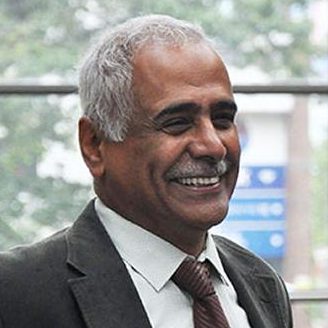
Professor AbuBakr S Bahaj, (FREng, FICE, FIET, FRSA, MInstP, CPhys) leads the Energy & Climate Change Division and the Sustainable Energy Research Group (ECCD)at the University of Southampton, where he completed his PhD, progressing from a researcher to a Personal Chair in Sustainable Energy. For more than 30 years, Professor Bahaj has pioneered sustainable energy research and established the energy theme within the University. His major research programmes include Renewable Energy, Energy Access, Cities & Infrastructure, Buildings & Communities, and Behaviour & Modelling. Further details are within the ECCD research portfolio booklet. Prof Bahaj also leads the University of Southampton’s Sustainable Strategy Implementation Group having the responsibility for implementing and delivering the University Sustainability Strategy.
Professor Bahaj’s work has resulted in over 350 articles, published in academic refereed journals and conference series of international standing. In 2013, he founded the International Journal of Marine Energy (IJOME) followed in 2018 by the International Marine Energy Journal (IMEJ) for which he was/is the Editor-in-Chief.
Prof Bahaj is a Fellow of the Royal Academy of Engineering (FREng), Fellow of the Institution of Civil Engineers (FICE), Institution of Engineering Technologies (FIET) and the Royal Academy of Arts (FRSA). He also holds visiting professorships at the Xi’an University of Architecture and Technology (XAUAT), Xi’an, China, (2017 – ), the Ångström Laboratory and Engineering University of Uppsala, Sweden (2011-15) and holds King Salaman bin Abdulaziz Visiting Chair for Energy Research, at King Abdulaziz University (KAU), Jeddah, Saudi Arabia (2014 – 2021).
In 2012, Prof Bahaj was appointed Chief Scientific Advisor to Southampton City Council—believed to be the first such appointment in the UK and was Co-Chairs of the inaugurated Southampton Climate Commission (2022-23). In 2014, he was named by the UK’s Science Council as one of the UK’s 100 leading practising scientists. Professor Bahaj is a Co-Chair of the Research Advisory Group for the Foreign and Commonwealth Development Office, and by virtue of this he is a member of the Chairs of Science Advisory Council, chaired by the Government Chief Scientific Advisor.
Professor A S Bahaj Research Areas
- Renewable Energy: Research and studies that address:
- Solar photovoltaics (PV): Research covers fundamental understanding of solar cells, system designs, building integrated PV, solar refrigeration, PV solar home systems and mini grids to provide electricity access in rural communities in Africa and elsewhere (see item 3, below).
- Marine energy: Research on wave and tidal energy encompass development of new knowledge which contributes to our understanding of the conversion of wave energy and the kinetic energy flows in the sea. This includes fundamental understanding of the resource, conversion device and energy yields from arrays.
- Wind energy : Research in wind energy is undertaken at various scales (i) urban wind energy in building at scale up to 5kW. The work culminated in the UK field trials where around 80 such turbines were monitored and reported on, (ii) onshore wind energy research was geared to identify factors that may influence the planning acceptance of onshore wind and (iii) offshore wind energy research provides developed modelling tools that brought in understanding, mapping and assessment of offshore wind energyresources and energy yields in the Middle East providing a blue print for sites development in the region.
- Low carbon cities and infrastructure: Research and studies that address:
- Link building refurbishments and occupier comfort to achieve reduced demand (Urban energy studies). Use of urban energy generation technologies such as solar photovoltaic (PV), micro wind turbines, micro combined heat and power (µCHP) and ground source heat pumps to address electricity and heat generation in cities and elsewhere. Large scale refurbishment of buildings, data and modelling, energy efficiency measures and application of combine heat and power (CHP) technologies in communities.
- This work builds on an EPSRC grant awarded through on Sustainable Urban Environments programme to develop tools for industry that created appropriate weather data sets as input to building simulation software. These tools are now the industry standard for generating such tools (Building performance under changing climate).
- In infrastructure a key challenge involves taking into account the ways in which infrastructure systems in one sector increasingly rely on other infrastructure systems in other sectors in order to operate. These interdependencies mean failures in one system can cause follow-on failures in other systems. The work has a bias to toward energy and city infrastructure and their resilience. This work is supported through programmes addressing the fast development within China (and the concomitant increase in carbon emissions) under Eco networks, the carbon emission reduction work being undertaken within UK cities funded by EPSRC and City Councils, Liveable Cities and the International Centre for Infrastructure Futures(ICIF).
- Energy for Development:
- Current works in Africa promoting and implementing electrification projects for impoverished rural villages without power sources, establishing and addressing villagers’ needs, investigating impacts on rural poverty and improving the health and wellbeing of the community. Through appropriately designed mini grids established in Kenya, Uganda and Cameroon this work is providing power to businesses in village hubs and extending access through appliance electrical charging to surrounding inhabitants. The research is also addressing looking at the resilience of mini grid networks and their connectivity with each other and with the national grid see www.energyfordevelopment.net.
Contact
Telephone: (023) 8059 2051
Email: A.S.Bahaj@soton.ac.uk
Building Number: 178
Boldrewood Innovation Campus
University of Southampton
Southampton, SO16 7QF
United Kingdom
